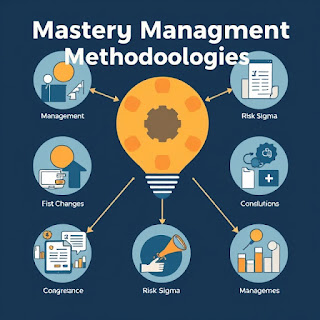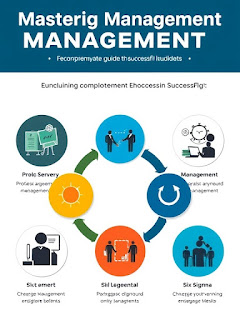Mastering Management Methodologies: A Comprehensive Guide to Success in Business
Effective management is the backbone of any successful organization, and mastering management methodologies is key to achieving this. Specialized methodologies and techniques like project management, process management, lean management, Six Sigma, Agile and Waterfall methodologies, quality management, change management, performance management, risk management, strategic planning, and stakeholder management are all essential tools for achieving success.
Leadership plays a crucial role in the success of any organization. Strong organizational behavior, communication skills, resource management, problem-solving techniques, and team building are also necessary for any organization to succeed. By employing these methodologies and leadership skills, individuals and organizations can achieve continuous improvement, make informed decisions, and develop strategies to drive growth and increase profitability.
Optimizing these management methodologies can pave the way for success in any industry, whether you are an employer, employee, or a business looking to improve their SEO. These skills are highly valued in the job market, making them a valuable asset for job seekers and employers alike, especially in regions like India, the Middle East, Europe, North America, and Asia-specific, including the hospitality industry.
When it comes to selecting the right management methodology for your organization, there is no one-size-fits-all solution. The choice of methodology depends on the specific needs, goals, and challenges of your organization. It is crucial to conduct a thorough analysis of your organization to identify areas of improvement and choose the methodology that best suits your needs.
Continuous improvement is essential for any organization to stay ahead of the competition. By mastering these methodologies, you can continuously improve your processes and strategies, ensure customer satisfaction, and drive business growth.
mastering management methodologies is a comprehensive guide to success in business. These methodologies provide a framework for effective management, decision-making, and continuous improvement. By implementing these methodologies and leadership skills, individuals and organizations can achieve success in any industry and stay ahead of the competition.
Mastering Management Methodologies: Your Comprehensive Guide to Success
Discover essential management methodologies like Agile, Six Sigma, and Lean to drive growth, improve efficiency, and lead effectively in any industry.
Effective management is the cornerstone of organizational success. From Agile to Lean methodologies, mastering these frameworks empowers leaders to optimize processes, foster innovation, and achieve strategic goals. This guide explores the essential management methodologies and their applications across industries.
Whether you're a business owner, a manager, or an aspiring leader, this article provides actionable insights to help you succeed in today’s competitive landscape.
1. What Are Management Methodologies?
Management methodologies are structured approaches and frameworks designed to streamline organizational processes, improve efficiency, and achieve objectives. They provide a roadmap for decision-making, problem-solving, and continuous improvement.
Popular methodologies include:
- Agile Management: A flexible, iterative approach ideal for fast-paced environments.
- Lean Management: Focuses on minimizing waste and maximizing value delivery.
- Six Sigma: A data-driven approach for reducing defects and improving quality.
- Waterfall Model: A linear and sequential approach suited for predictable projects.
2. Why Management Methodologies Matter
Implementing effective management methodologies ensures that organizations remain competitive, agile, and customer-focused. Key benefits include:
- Efficiency: Streamlined processes reduce time and resource wastage.
- Consistency: Standardized practices lead to predictable and reliable outcomes.
- Innovation: Encourages adaptability and creativity to meet evolving market demands.
- Team Alignment: Ensures all stakeholders work towards shared goals.
3. Top Management Methodologies Explained
3.1 Agile Methodology
Agile emphasizes flexibility, collaboration, and customer feedback. It's widely used in software development but is adaptable to other industries.
Best For: Dynamic, fast-changing environments.
Key Tools: Scrum, Kanban, Jira.
3.2 Lean Management
Lean focuses on eliminating waste and delivering value efficiently. It’s particularly popular in manufacturing and operations.
Best For: Process optimization.
Key Tools: Value Stream Mapping, Kaizen.
3.3 Six Sigma
Six Sigma uses statistical analysis to identify and eliminate defects. It enhances quality and customer satisfaction.
Best For: Quality control and improvement.
Key Tools: DMAIC, DFSS.
4. Leadership and Management Synergy
Leadership skills are integral to the successful implementation of management methodologies. Effective leaders guide teams, resolve conflicts, and ensure organizational alignment.
Essential Leadership Skills:
- Vision: Setting a clear direction.
- Empathy: Understanding team needs and motivations.
- Problem-Solving: Addressing challenges effectively.
- Communication: Ensuring clarity and transparency.
5. Choosing the Right Methodology
No single methodology suits all organizations. The choice depends on factors like industry, team structure, and business goals. Here’s a comparison table to help you decide:
| Methodology | Best For | Key Benefit |
|---|---|---|
| Agile | Fast-paced projects | Flexibility |
| Lean | Process efficiency | Waste reduction |
| Six Sigma | Quality control | Defect elimination |
Frequently Asked Questions (FAQs)
What is the difference between Agile and Lean?
Agile focuses on flexibility and collaboration, while Lean emphasizes waste reduction and efficiency.
How do I choose the right management methodology?
Consider your industry, team structure, and goals. Agile works well in dynamic settings, while Lean suits process-heavy industries.
Conclusion
Mastering management methodologies is key to organizational success. By understanding and applying frameworks like Agile, Lean, and Six Sigma, leaders can drive innovation, enhance efficiency, and achieve their strategic goals. Start implementing these methodologies today to stay ahead of the competition.
Take the Next Step in Management Mastery!
Explore our recommended tools and resources to enhance your management skills.
Learn More







